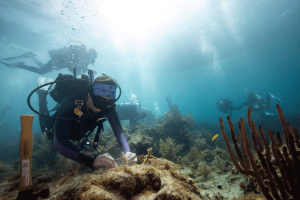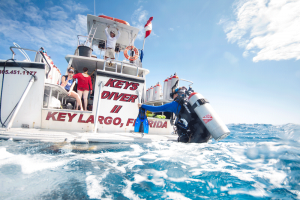Coral Restoration Delivers Immediate Economic Boost, New Study Finds
Florida Keys case study shows ecosystem restoration can provide resilient jobs in addition to long-term environmental benefits
The act of coral restoration can provide resilient economic stimulation to a local economy and support coastal communities immediately.”
TAVERNIER, FL, UNITED STATES, October 1, 2025 /EINPresswire.com/ -- A new peer-reviewed study published in Restoration Ecology reveals that coral restoration not only helps ensure that coral reefs have a future but also provides measurable and immediate economic benefits to local communities.— Dr R. Scott Winters, CRF CEO
The research, led by Coral Restoration Foundation™ (CRF™) CEO Dr. R. Scott Winters and CRF™ Socioeconomic Associate, Madeline Rothwell, demonstrates that investments in coral restoration can stimulate local economies by supporting jobs, small businesses, and community resilience, independent of whether restored reefs deliver ecological benefits years down the line.
“Coral reefs are vanishing at an unprecedented pace, which is both an ecological disaster and humanitarian crisis,” said Dr. Winters. “This study contributes to the literature on the restoration economy, demonstrating that the act of coral restoration can provide resilient economic stimulation to a local economy, and support coastal communities immediately.”
Using economic impact modelling, the study examined the Florida Keys between 2018 and 2022. Researchers found that for every dollar spent, restoration activities contributed between 120% and 144% to the local economy. Importantly, this economic activity also displayed remarkable resilience, as demonstrated in the Keys during the COVID-19 shutdowns, when most other industries suffered catastrophic losses.
“Coral restoration isn’t just about planting corals,” explained Rothwell. “It creates jobs, sustains local businesses, and keeps money flowing even in downturns. This economic resilience is a benefit that has been overlooked in policy and funding discussions.”
The paper distinguishes between two sources of socio-economic benefit from (coral) restoration:
The Activity: The act of restoration itself that injects money into the economy immediately by hiring staff, running boats, maintaining nurseries, partnering with dive shops, and more. These funds then “ripple” through the local economy in the form of employee and further business-to-business spending.
The Outcomes: If restoration succeeds ecologically and reefs recover, the “value” of the reef increases; fisheries, tourism, and coastal protection improve, and future generations enjoy these renewed services.
The study emphasizes that both of these sources of benefits matter and should be considered by communities, funders, and governments.
The findings carry three major implications for how coral restoration should be designed, funded, and evaluated:
1. Local goals matter most. The socio-economic benefits from coral restoration can be obtained in two ways, which may be additive or in conflict. And so, the motivation for coral restoration – such as addressing the specific harms to local communities that result from the loss of their reefs – will differ across local communities. This is why it is critical that restoration project goals should be set by local communities, based on their local values.
2. Beneficiaries must be clear. Because socio-economic benefits can come from two pathways, temporarily separated, the benefits can be accrued to different parties – the current community or a future community. Economic stimulus may benefit the current community, while ecological recovery benefits future generations. Projects should clearly identify the intended beneficiary of restoration.
3. Restoration can qualify as economic stimulus. Like road building or habitat conservation jobs programs, restoration spending should be considered when governments consider policies and actions to stimulate local economies.
“Coral restoration delivers ecological benefits that are vital for the future of our reefs,” said Winters. “What this study adds is the understanding that the value goes even further—beyond coral survival—to include the resilience of local economies and communities today.”
Globally, nearly one billion people depend on coral reefs for food, income, and protection. Yet reefs are under accelerating threat from climate change, pollution, and overuse. While large-scale reef recovery will ultimately require climate solutions, the study underscores that restoration projects can deliver near- term returns. The action of restoration needs to be guided by why we value coral reefs, the motivation of our actions, and who are the intended beneficiaries.
By quantifying those returns, the authors hope to broaden the conversation about how and why coral restoration is funded. Governments and international development agencies that already use ecological restoration as a tool for economic stimulus may now look to coral projects as part of those strategies.
“This study gives policymakers another case for supporting restoration,” said Rothwell. “It’s not just about the ecology, restoration is an economic opportunity that creates jobs, builds resilience, and improves people’s lives.”
The paper, “Coral restoration as economic stimulus: a case study from the Florida Keys (United States)”, was published September 25, 2025, in Restoration Ecology. It is open access and available at: http://doi.org/10.1111/rec.70204.
About Coral Restoration Foundation
The Coral Restoration Foundation (CRF) is the world’s largest nonprofit organization dedicated to restoring coral reefs. Based in the Florida Keys, CRF™ develops and implements large-scale, science-based strategies to grow, outplant, and monitor corals, pioneering techniques now used around the world. By combining cutting-edge innovation, hands-on restoration, and global collaboration, CRF™ empowers communities and practitioners everywhere to help secure a future for these vital ecosystems.
Beth Vessels
Coral Restoration Foundation
+1 305-453-7030
email us here
Visit us on social media:
LinkedIn
Instagram
Facebook
YouTube
X
Legal Disclaimer:
EIN Presswire provides this news content "as is" without warranty of any kind. We do not accept any responsibility or liability for the accuracy, content, images, videos, licenses, completeness, legality, or reliability of the information contained in this article. If you have any complaints or copyright issues related to this article, kindly contact the author above.



